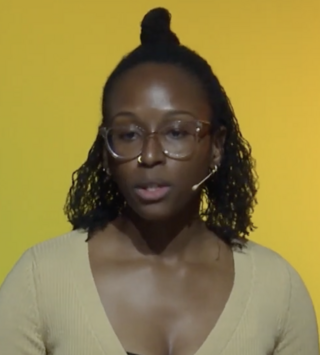
The Society of Women Engineers (SWE) is an international not-for-profit educational and service organization. Founded in 1950 and headquartered in the United States, the Society of Women Engineers is a major advocate for women in engineering and technology. SWE has over 47,000 members in nearly 100 professional sections, 300 collegiate sections, and 60 global affiliate groups throughout the world.

The presence of women in science spans the earliest times of the history of science wherein they have made significant contributions. Historians with an interest in gender and science have researched the scientific endeavors and accomplishments of women, the barriers they have faced, and the strategies implemented to have their work peer-reviewed and accepted in major scientific journals and other publications. The historical, critical, and sociological study of these issues has become an academic discipline in its own right.

Science, technology, engineering, and mathematics (STEM) is an umbrella term used to group together the distinct but related technical disciplines of science, technology, engineering, and mathematics. The term is typically used in the context of education policy or curriculum choices in schools. It has implications for workforce development, national security concerns, and immigration policy, with regard to admitting foreign students and tech workers.

Females in Nigeria have a basic human right to be educated, and this right has been recognized since the year 1948 adoption of the Universal Declaration on Human Rights (UDHR) According to a report in 2014, female education has an important impact on the development of a stable, prosperous and healthy nation state resulting in active, productive and empowered citizens. Educating girls develop growth rates, encourages independence of the girl child and reduces social disparities. In 2009, the Nigerian Population Council (NPC) observed that women with higher educational qualifications are more likely to be in formal wage employment than those at the level of primary school education.

Women are often under-represented in the academic and professional fields of engineering; however, many women have contributed to the diverse fields of engineering historically and currently. A number of organizations and programs have been created to understand and overcome this tradition of gender disparity. Some have decried this gender gap, saying that it indicates the absence of potential talent. Though the gender gap as a whole is narrowing, there is still a growing gap with minority women compared to their white counterparts. Gender stereotypes, low rates of female engineering students, and engineering culture are factors that contribute to the current situation where men dominate in fields relating to engineering sciences.

Many scholars and policymakers have noted that the fields of science, technology, engineering, and mathematics (STEM) have remained predominantly male with historically low participation among women since the origins of these fields in the 18th century during the Age of Enlightenment.

Mary Golda Ross was the first Native American female engineer. She was also the first female engineer in the history of the Lockheed Corporation. She worked at Lockheed from 1942 until her retirement in 1973, where she was best remembered for her work on aerospace design. She was one of the 40 founding engineers of the renowned and highly secretive Skunk Works project while at Lockheed Corporation. Throughout her life, Ross was dedicated to the advancement of young women and Native Americans in STEM fields. Ten years after her death, in 2018, Ross was chosen to be depicted on the 2019 Native American $1 Coin by the U.S. Mint celebrating Native Americans in the space program.

Aprille Joy Ericsson is an American aerospace engineer currently serving as the assistant secretary of defense for science and technology. Ericsson is the first African-American woman to receive a Ph.D. in mechanical engineering from Howard University and the first African-American woman to receive a Ph.D. in engineering at the National Aeronautics and Space Administration (NASA) Goddard Space Flight Center (GSFC).
Ebele Ofunneamaka Okeke CFR and OON is a Nigerian Civil engineer and former Head of Nigerian Civil Service.
Rabia Salihu Sa'id is a Nigerian physicist, professor of atmospheric and space-weather physics, and a researcher at Bayero University Kano. She conducts research in atmospheric and space weather physics, particle physics, and electronics. Sa'id is an advocate and mentor for young women in science with the Visiola Foundation and Peace Corps; she co-founded Nigeria's Association of Women Physicists. She is an advocate and mentor of Science, technology, engineering, and mathematics (STEM) education and is a facilitator for the British Council's Active Citizens' Programme.
Adenike Adebukola Akinsemolu is a Nigerian sustainability advocate, educator, author, and a social entrepreneur. She is a lecturer at Obafemi Awolowo University. She is known as one of the country's leading experts on environmental sustainability.
Olaoluwa Abagun is a Nigerian lawyer, feminist, and a Vocal Girls' Rights Advocate, nurturing a dynamic generation of African Girls. She is the Founder of the Girl Pride Circle Initiative, a notable girl NGO situated in Nigeria, she holds the position of Executive Director at ATHENA, a global feminist network dedicated to promoting gender equality and upholding human rights
Professor John Perkins' Review of Engineering Skills, also known as the Perkins Review, was a 2013 report commissioned by the Department for Business, Innovation and Skills (BIS) on engineering training and the skills shortage in the United Kingdom. Principally authored by the Chief Scientific Adviser to the BIS, it made key recommendations for improving the training of British engineers and encouraging more entrants into the profession. Key aspects it highlighted included the gender gap, with ten times more men employed in the profession than women, and the current reliance on foreign engineers.

Ire Aderinokun is a Nigerian front end developer and Google developer expert. She is Nigeria's first female Google Developer Expert.
Joana Maduka is a Nigerian engineer. She became the first female fellow of the Council for the Regulation of Engineering in Nigeria (COREN) in 1974. She is also a fellow of the Institution of Electrical Engineers, the Nigerian Society of Engineers and the Nigerian Academy of Engineering. She was made an honorary fellow of the Nigerian Institute of Science Technology in 1987 and Yaba College of Technology in 1988. She was honoured as a Member of the Order of the Federal Republic in 2008. She was the first female COREN President.
Idiat Aderemi Amusu is a Nigerian engineer. She is the first female agricultural engineer in Nigeria and the first female council member of the Council for the Regulation of Engineering in Nigeria (COREN). She was among the original founding members of the Association of Professional Women Engineers of Nigeria (APWEN) in 1983.

Farida Mohammad Kabir is a Nigerian epidemiologist, software developer, and technology entrepreneur. She is the team lead for Google Women TechMakers and co-organizer for Google Developer Group, Abuja. She is also the founder/CEO of OTRAC, a health technology company that develops enterprise software systems for the healthcare sector in Nigeria.
Olatokunbo Arinola Somolu is a Nigerian structural engineer. She was the first Nigerian woman to gain a PhD in any engineering field.
Aya Mouallem is a Lebanese electrical engineer, researcher, and a Knight-Hennessy Scholar at Stanford University. She is the co-founder, co-director, and current board advisory member of All Girls Code, a volunteer-led initiative to provide Lebanese female youth with coding experience. Mouallem is active in the field of Arab youth women empowerment in STEM.

Omowumi Ogunrotimi is a Nigerian multidisciplinary legal practitioner, founder and executive director of Gender Mobile Initiative. She has worked in over 50 rural communities advocating for safe spaces for vulnerable populations, particularly girls and women.










